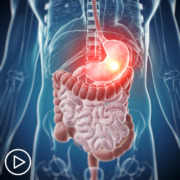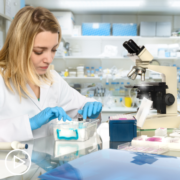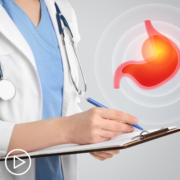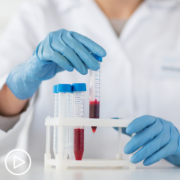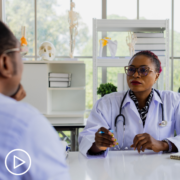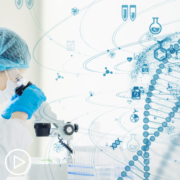Gastric Cancer: How to Access the Best Care and Treatment for YOU from Patient Empowerment Network on Vimeo.
Advances in gastric cancer research have led to more personalized therapy for patients. Dr. Yelena Janjigian discusses how biomarker testing can help guide a patient’s prognosis and treatment path, reviews currently available gastric cancer therapies, and shares tips for self-advocacy.
Dr. Yelena Janjigian is Chief of Gastrointestinal Oncology Service at Memorial Sloan Kettering Cancer Center.
See More From INSIST! Gastric Cancer
Download Resource Guide
Related Programs:
Transcript:
Katherine:
Hello and welcome. I’m your host, Katherine Banwell. Today’s program focuses on helping patients understand gastric cancer treatment options based on their individual disease. We’ll review the latest research and provide tips for self-advocacy to help patients access better care.
Before we meet our guest, let’s review a few important details. The reminder email that you received about this webinar contains a link to a program resource guide. If you haven’t already, click that link to access information to follow along during the webinar. At the end of this program, you’ll receive a link to a program survey. Please take a moment to provide feedback about your experience today in order to help us plan future webinars.
And finally, before we get into the discussion, please remember that this program is not a substitute for seeking medical advice. Please refer to your healthcare team about what might be best for you. Well, let’s meet our guest today. Joining me is Dr. Yelena Janjigian. Dr. Janjigian, welcome. Would you please introduce yourself?
Dr. Janjigian:
Thank you so much, Katherine, for this opportunity. My name is Yelena Janjigian. I’m a medical oncologist. And I oversee the GI oncology service at Memorial Sloan Kettering Cancer Center in New York. We’re a large group of doctors, over 40 physicians who treat everything from esophagus cancer to rectal cancer. And my research focus and my passion has been in developing new treatments for patients with stomach cancer, so I personally focus on this disease clinically and from research perspective.
Katherine:
Okay. Lovely.
Well, thank you so much for joining us today. I’d like to start by learning about the latest research news. Are there recent advances in gastric cancer that patients should know about?
Dr. Janjigian:
That’s a great question. The field of gastric cancer research has accelerated and evolved immensely over the last three years. We’ve had several important approvals for treatment of metastatic disease both for biomarkers selected population and immunotherapy targeted therapies. So, there’s been a lot of research, a lot of effort and some positive data that the patients and clinicians should be aware of.
Katherine:
And what excites you about the research you’re involved with?
Dr. Janjigian:
I’ve been focused on gastric cancer for nearly two decades. So, my recent advances have really helped to understand how we can improve patient’s survival better, potentially cure more patients, and understand the different subsets of cancer treatments and patients with gastric cancer understanding that not all gastric cancer is the same.
So, I think being able to zoom in on different subsets and target personalized approaches for each individual patient is why I stay in research, why I stay in gastric cancer research because we’ve been able to make some major breakthroughs.
Katherine:
That’s excellent news. How can patients stay up to date with treatment options?
Dr. Janjigian:
That’s a great question. And recently there’s been a lot of resources online through both the big pharma really educating patients with patient-friendly handouts. And many of my big recent papers when we publish them in big journals like Lancet or Lancet Oncology, for example, or JCO, there’s always a patient-friendly handout that comes with that data that helps patients understand some of the endpoints, how do we describe why this study is positive?
Or why is the FDA decided to approve the drug? So, there are many patient handouts that come with some of these papers. And it’s interesting, a lot of my patients come in. When they see me, they say, “Oh, it’s so good to finally meet you. I’ve watched a lot of your videos.” So, because of COVID actually, a lot of the scientific content that used to be just in in-person meetings behind doors for doctors, now it’s all online because a lot of these scientific presentations are now made for virtual content as well. So, patients have access to it. That’s double-edged sometimes. It’s a little bit of an information overload, and it may actually make patients feel more anxious than reassure them, right? Because it’s a lot of jargon and not too – but some patients find it helpful.
Katherine:
Yeah, I can see that. It can be a double-edged sword.
Dr. Janjigian:
Yeah.
Katherine:
Well, thank you for that advice. So, now that we’ve heard what’s happening in research, let’s review some more basic information about gastric cancer. First, gastric cancer is sometimes referred to as stomach cancer. Is that the same thing, or are both terms correct?
Dr. Janjigian:
Yeah. So, stomach is really where the cancer starts. But we can talk about stomach or abdomen. But gastric and stomach are the same tumor location basically. What’s interesting actually, some patients also have tumors that start at the bottom of their esophagus and extend into the stomach. So, biologically a lot of these cancers behave similarly. In fact, in United States the most common location for these cancers actually is in between the gastric esophageal junction and the stomach.
So, it’s in the location in of the cancer that’s at the very top of the stomach. But in short, stomach cancer and gastric cancer are interchangeable. And as I mentioned, for many of our viewers, actually gastro-esophageal junction is also part of the same disease.
Katherine:
Could you tell us what tests are used to diagnose gastric cancer?
Dr. Janjigian:
Most of our patients, when they come in to see me, by then the diagnosis of cancer has been made because I’m on oncologist.
In clinical practice, patients often present with vague symptoms or no symptoms at all. And that’s an important point for our clinicians to understand. In patients who have chronic acid reflux or have, for example, other risk factors such as H. pylori infection, often they end up getting endoscopy at the time, for example, for their first colonoscopy. So, the age of colonoscopy, the first colonoscopy has is getting earlier and earlier with each update, because colon cancer is increasing in incidents in younger adults. So, sometimes patients present and get first endoscopy, for example, which is an upper test with a camera when they’re getting their colonoscopies. In other patients, unfortunately, they present with more progressive symptoms. Often, it’s difficulty swallowing, regurgitation of food, and weight loss, which is obviously very dramatic.
And so they end up getting an endoscopy because of that and referred by their doctors.
Katherine:
How is gastric cancer staged? And what do the stages mean?
Dr. Janjigian:
Yeah. So, the most important part of the staging of gastric cancer and what patients ask me, “What is my risk of cancerous recurrence? What is my stage?” Really what it comes down to is the depth of invasion. So, it’s not only the size of the tumor, but how deep is it going into the muscle of the stomach, because stomach and your esophagus are basically a muscular bag, right? And so how deep is the invasion of the tumor into the wall? And also how likely are the lymph nodes to being involved? So, we assess it based on clinical symptoms such as swallowing difficulty and so forth. But in some patients, because the tumor is lower down in their stomach, they may not have very many symptoms, because there’s a lot more give in this muscular bag that our stomach is.
And so we test the endoscopic ultrasound to look at the depth of an invasion and also other X-ray type imaging such as a PET scan, a P-E-T scan or a CAT scan, which gives us a sense of tumor location whether or not we think the lymph nodes may be involved. And ultimately the final way to assess, especially in patients who are undergoing surgery, is their microscopic involvement of the lymph nodes? Because that often drives the likelihood of cancer coming back after surgery.
Katherine:
And how do the stages work for gastric cancer?
Dr. Janjigian:
So, in gastric cancer it’s either early, intermediate, or late stage. And this goes from stage I to IV. So, stage IV tumors is where most of the cancers are present. Over probably 50 percent of our patients present already at the time of diagnosis with more advanced stages.
Biologically this cancer just tends to move quickly. So, even in between endoscopies in patients who get endoscopies frequently, often it goes from 0 to stage III or IV because of the lymph node involvement and also spread of microscopic cells, right? Tiny, tiny cells before we even see them, they spread through the bloodstream to other organs or lymph nodes outside of your abdomen. So, that’s considered to be stage IV. And then early, early stage disease is stage I. Those usually that we can just scoop them out using endoscopic procedures. They don’t even need to have full surgery. And then stage II and III is usually if there’s some involvement of the tumor through the muscle or into the muscle of the stomach and also some lymph node involvement. But that’s how we stage it.
Katherine:
Okay. I’d like to move onto current gastric cancer treatment options. Can you provide an overview of what’s available now?
Dr. Janjigian:
Right. So, in patients with intermediate or early-stage tumors, really surgery is the main way to cure patients. Occasionally when we have an amazing response to chemotherapy or chemotherapy with immunotherapy or just immunotherapy, we can avoid surgery. But in most patients, surgery in early-stage disease is a gold standard for cure. Of course, it can be a very jarring thing to say to someone. “We have to take out. your stomach.” But patients do live without either fully their stomach removed or partially removed. And that’s the gold standard. We do additionally other treatments to help maximize chances of cure, but surgery is the main state. As I mentioned earlier, most of our patients, however, present with later stages where surgery is not feasible.
And when I say it’s not feasible, we would only attempt an operation if we thought there was a possibility of removing the cancer completely. Leaving some of the tumor behind, even if it’s only 1 percent of the cancer behind, makes patients unwell. They may not be able to tolerate additional chemo, so we do not recommend doing suboptimal surgery unless cancer can be completely removed. So, in those patients, we always explain the situation. And the disease is not potentially as curable, but it’s absolutely always treatable. And since the development of our immunotherapy options, really, we’ve changed the trajectory and the course of those cancers. We won’t know the stage or the final response to therapy until we’ve start it. But in those patients, usually a form of long-term therapy. Chronic treatment is very important.
And usually it involves a combination of chemotherapy and some targeted agents, biologic agents, meaning that they were designed in the lab to target the cancer specifically. And usually, they involve some sort of immunotherapy.
Katherine:
Excuse me. Can you go into some detail about the targeted therapies and immunotherapies that you use?
Dr. Janjigian:
Sure. So, conventional chemotherapy works on any rapidly dividing cell. And these are chemotherapies that have been tried and true in the clinic for decades, right? And they work still in gastric. And in particular they’re very important. And then over the last 10 years or so, we’ve started developing target agents in the lab that target the specific biologic tumor biomarkers. And when you think about tumor biomarkers, I would think about them as almost ZIP codes, right? How do you direct the cancer cell to die?
And how do you inhibit the cancer cell for the thing that is uniquely what’s making it grow as opposed to normal cells, right? So, that’s the difference between chemotherapy because chemotherapy can affect any rapidly dividing normal cell and cancer cell, while biologic agents ideally only affect the target, cancer, the cell. So, that’s why it’s very appealing to do both to help maximize response and survival on treatment. So, the biologic therapies that are available in and already approved in our disease for stomach cancer are something called HER2 directed treatments. And that’s been my focus in the lab. And then in my group has really spearheaded a lot of this research for HER2-positive tumors. In gastric cancer it occurs in up to 20 to 30 percent of tumors, but we have drugs such as trastuzumab or Herceptin, T-DXd, trastuzumab deruxtecan-nxki (Enhertu) or in HER2 that target these agents.
And furthermore, our work here at Memorial Sloan Kettering demonstrated the combination therapies really for HER2-positive disease has helped improve outcomes in those patients. So, that’s biologic therapy. Other biologic therapies that’s approved in gastric cancer is something called VEGFR-2 inhibitor. These are drugs that target blood vessel formation around the tumor to help the chemotherapy drugs work well and better. Those drugs are called ramucirumab or Cyramza. And that’s used in a combination of chemotherapy in second-line treatment. And there’s other drugs such as regorafenib (Stivarga) and other inhibitors that maybe have some targetable activity in our disease. And last but not the least is immunotherapy. So, immunotherapy’s a completely different class of drugs.
We think about immunotherapies, really the fundamental problem with cancer, right? The cancer issues that it started as a normal cell. So, at some point, it was a normal cell that then became and went awry and went rogue. And the body did not recognize that there was a problem. And the immune system did not eliminate that cancer cell. Before it started to metastasize and give us problems in their body, right? So, the fundamental question is why is the body’s immune system, why did it not recognize it as a abnormal cell? Well, because it really acts and looks like a normal cell from the immune perspective. Our immune system is trained not to hurt us, right? And that’s why in patients with rheumatoid arthritis or other autoimmune disorders, what happens is the immune system goes awry. So, what the immune checkpoint blockade or immunotherapy for cancer does, is it helps take some of those brakes off our immune system and help our immune system recognize the cancer and give it permission to say, “Hey, you know what?
You thought it was a normal cell. It’s not. It’s a cancer cell. Please help us eliminate it.” And that’s worked well because I think in for some of our patients, the immune system actually knows how to target and suppress the cancer much better than any of the fancy drugs we can design in the lab. And that’s why in some patients, immune checkpoint blockade immunotherapy has been such a game changer if you do respond, your duration and durability of response is so much more better than anything that would go to just done on our own in the lab or with other chemotherapies. So, it really is a nice way to think about it. And the patients feel like they’re part of the solutions. It’s always nice for them to have that.
But it’s been a real game changer for both HER2-positive and HER2-negative disease in combination with chemotherapy. I’ve had the pleasure of leading some of these studies. And it’s nice to be able to update the three or the four or the five-year survival rate from these studies in a disease where in the past most patients died within a year.
Katherine:
Dr. Janjigian, I’d like to talk about what goes into deciding on a best treatment for a patient. Is there testing that helps you understand a patient’s individual disease?
Dr. Janjigian:
One is an important factor about this disease, and when the patient comes in, the number one factor that helps us decide, what treatment to assign, is how well is the patient feeling? What are their nutritional deficits? How functional they are. Are they able to tolerate the treatment?
Because as an oncologist, the first rule is do no harm. Most patients come in when they’re first diagnosed are pretty well functional. They’re still able to eat. And so, they’re really up for the most aggressive. And that’s probably the number one wish I have from patients. I just want us to stay well and stay alive. So, we can be very aggressive with them, at least folks that come to see us in New York. And so, then the decision fork is really do you want only standard therapy, or are you interested in clinical trials? And I think what I am able to really explain to the patients, which is great, is that the benefit of trials – and, of course, you can never guarantee that a trial will be successful, right? Because that’s by definition – a clinical trial is experimental therapy. But for gastric cancer and stomach cancer where we need as many treatment options as possible, a clinical trial gives you an opportunity to try something different, and then go back to standard therapy, and then try experimental therapy, and then go back to standard therapy.
So, it gives you as many options as possible. The way that I help our patients visualize this is you’re trying to cross a very wide and somewhat turbulent river. And you need as many stepping stones as possible. And a clinical trial, if it makes sense for you and if you’re able to do it physically, it gives you that other option. The most important other factor is to understand which subset of stomach cancer you have, right? Because biomarker testing has helped us tremendously to advance this disease. If you look at and if you watch any of my talks, I usually have this timeline of therapeutic development in stomach cancer until really this past year.
We’re 2022, 2021. There was over a decade of negative trials, right? And the reason why I think is because the design of the trial really focused on targeting all the patients the same way. And now the trials are becoming more and more sophisticated. So, when we talk about the biomarker testing of the tumor, the patient’s specific tumor.
It’s important for the patient to ask their physician. “What is the status of my tumor?” And the four critical biomarkers are microsatellite instability, HER2, PD-L1, and Claudin-18.2. So, those four biomarkers have really helped us transform this field especially in patients with metastatic disease. And in all of the tertiary cancer centers, certainly here at Memorial Sloan Kettering, for each of the subsets we have a full research portfolio.
So the patients have both standard and experimental options available to them.
Katherine:
Well, how can test results like biomarker testing affect the patient’s prognosis and treatment options?
Dr. Janjigian:
It will depend on the treatment and how it is paired to the biomarkers. So, for example, a certain subset of tumors such as microsatellite and stable tumors are patients with PD-L1 high tumors or even patients with HER2-positive tumors. Now in clinical trials, we see that those patients have an outstanding dramatic response to combination therapies often with chemotherapy or immunotherapy together or even HER2 directed therapy with immunity therapy. So, it really will impact how likely your tumor is to shrink. And if the tumor is shrinking, and if you’re feeling better, obviously that translates to better survival.
Katherine:
Yeah. What questions should patients be asking about their test results?
Dr. Janjigian:
I think it’s important for patients to be very clear with their providers about their willingness to undergo repeated biopsies if needed.
I think the number one misunderstanding or misnomer that I see when patients come in to see me as a highly trained specialists, and they’re seeking me out for expertise and second and third and fourth opinions is that when the biomarker test is not done, often the answer in the community from the physician was, “Well, there was insufficient tissue or the tissue quality was not great, and that’s we’re going to do it. And it turns out the patient is perfectly willing and able to undergo a second biopsy. They really do not mind because a lot of times it’s just as simple as having a repeat endoscopy. Or even on treatment off and the problem is it’s a constantly evolving cancer. So, for example, if you receive first-line treatment and then you progressed and you need additional treatment, often it’s important to get a second biopsy to understand what your biomarkers are at that point.
And I described this to my patients. We can’t get into a battle with outdated maps. We need to know. And sometimes when there’s a misunderstanding, the doctors think, “Maybe the patient wouldn’t be willing to do it. Or they are risk-averse.” And the patient’s more than willing to do it. So, I think communicating your wishes and your intent clearly with your doctors and not being shy to ask questions, and also not being shy to seek out clinical trials, right? So, yesterday I was in clinic. I see a lot of this disease. I often see 30 patients at clinic. I had an 80-year-old patient in my clinic, right? And before you meet the patient, most doctors would think, “Well, it’s an elderly patient. They wouldn’t even be interested in clinical trials. What are we trying to accomplish here?”
Katherine:
Right.
Dr. Janjigian:
But this patient clearly is – he exercises five days a week. He’s extremely active. He wants the best options for him.
So, I am not an ageist, so I asked him. I said, “What are your sort of goals of this therapy? And how interested are you in clinical trials?” And him and the family were extremely enthusiastic. And, “We’re going to go for it, and we’re going to try.” So, I think having those conversations with your doctors – because you remember gastric cancer is very rare. In my clinic I see 30 patients, but in most normal sort of oncology practices, it’s lung, breast, and colon, the big three that sort of saturate the schedule of the oncologists. So, if they see one or two gastric cancers a month, they may not be thinking along the same lines of your disease. So, then you have to ask the questions of, “Are there any clinical trials? Should I see a specialist?” Did you do all of my biomarkers?
Katherine:
Yeah, yeah. That’s really great information to have.
Are there other decision factors involved in deciding on treatment options? You mentioned age, comorbidities. What else do you look at?
Dr. Janjigian:
Yeah, the other important factor as I said is nutrition. Being able to stay fit and stay independent is very important. Some of my patients ask me, and then they feel like what they eat is so important that as soon as they get their diagnosis, they restrict their diet. And then they start losing weight. And that’s not good. The number one negative prognostic factor is if you lose more than 10 percent of your body weight within the first few months of the diagnosis – because you get really weak, and then you can’t tolerate the chemotherapy. So, I tell the patients, “Your body will take from you whatever it wants. The cancer will take from you, from your body. So, you need to support yourself nutritionally.” So, if you don’t feel like eating a salad, but you are craving a cookie, it’s okay.
Have that cookie; just don’t lose weight. And I think that’s the number one. And also, the other factor is how do you communicate your diagnosis and your prognosis to your family and your friends? Because then everybody’s asking and making you in some ways anxious, your job. And what I tell patients is, “It’s on need-to-know basis.” If you find love and support, then you can tell people. Otherwise, you can just loosely kind of mention that you need some help, and you’re going through treatment without specific details. And the great part about these combination immunotherapies is that a lot of our functional patients actually continue to work through this. And so, we fill out whatever forms they need for their jobs and so forth. But we have lawyers that are continuing to work, teachers, and sometimes even construction workers. So, really, I would say make decisions as they come up.
Don’t run too far ahead and sort of assume that you’re going to not be well. But if you want to take some time off, that’s okay too. And so, I think the treatment paradigm for this disease has evolved so much that there’s a lot of misconceptions. And I think the job of a good oncologist is to let the patient live their life in as normal a fashion as possible. So, we work the chemo schedules around their schedule. Some of these immunotherapies you can give once a month. So, I have patients who will fly into see me, for example, get the dose, and then go back home. So, I think don’t be afraid to ask for what you need.
Katherine:
Yeah. Well, that leads us very smoothly into self-advocacy. And it’s really important that patients advocate for themselves. So, if a patient has a question or they’re unsure about a decision, why is it so important for them to speak up?
Dr. Janjigian:
What I always tell my patients and I explain to them, that often the doctors know a lot of information. But there’s so much information that it’s almost impossible to – and we only have 15 to 20 minutes together. So, it’s almost impossible to communicate everything that we know to you. So, you need to drive a bit of what the focus is of priorities in each visit and get as much information as you can. But also in some ways, follow the doctor’s lead. So, it’s a balance of information exchange. Use the portal as much as possible as well. The patient portal is often for follow-up questions. Write questions down. We have our nurse practitioners, our nurses, our fellows that continue to educate the patients because as things come up, and the field is so complicated that there are just so many things that you can ask at one single appointment.
So, it’s okay to forget something, but just write it down. In the end like anything else, you only have one sort of chance to do this in a way that you want it to be done. And as treatment progresses and you’re not feeling well, and maybe you don’t want to keep coming in for appointments and would rather go spend time in Aruba or Florida or somewhere sunny as opposed to – that’s okay. I think a lot of times it’s your life. You only have one. And I strongly believe in anything to try to get as much out of every interaction as possible using all the resources that are available to you.
Katherine:
Well, I’d like to close today with getting your thoughts on how you feel about the state of gastric cancer care. Are you hopeful about treatment options?
Dr. Janjigian:
I’m extremely hopeful. And usually, I finish all of my scientific talks. I’m a physician scientist.
I travel a lot to meetings. And my goal now in my career is to attract more and more young talent and scientists that will help us make the next wave of breakthroughs for this difficult disease. I think we’ve made a lot of progress, but the reality is: We’re still not curing enough patients. And so, our next wave is not just to stabilize and help people live longer but cure them definitively and permanently. And so, I finish every single presentation I have by how much the possibility and how fruitful this field has been. Personally, for my work and career of those that I’ve mentored throughout the years all over the world. So, I’m very hopeful for the next five, 10 years in this field. It will continue to get better.
Katherine:
It sounds very promising. Dr. Janjigian, thank you so much for joining us today.
Dr. Janjigian:
Thank you. Great question.
Katherine:
And thank you to all of our partners.
If you’d like to watch this webinar again, there will be a replay available soon. You’ll receive an email when it’s ready. And don’t forget to take the survey immediately following this webinar. It will help us as we plan future programs. To learn more about gastric cancer and to access tools to help you become a proactive patient, visit powerfulpatients.org. I’m Kathrine Banwell. It’s good to have you with us today.

